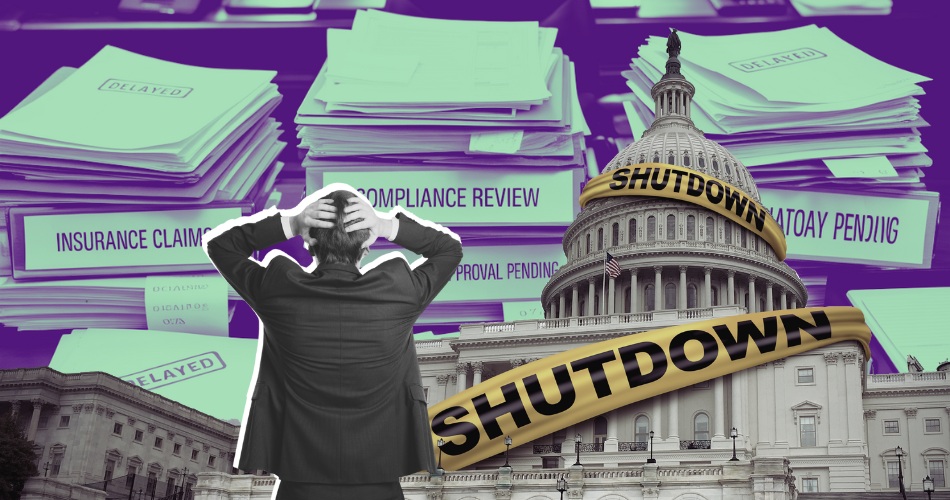
When most people think about a government shutdown, they think about missed paychecks or delayed loans. But for small businesses in regulated industries—manufacturing, food and beverage, importing, construction, health services—the more serious risk is quieter: frozen approvals, halted inspections, and regulatory timelines that keep moving even when the agencies don’t.
That’s what makes the 2025 shutdown different for Main Street. While federal staff are furloughed and systems operate in “minimum operations” mode, the compliance clock for businesses doesn’t pause. And when the government restarts, the backlog can create scrutiny, penalties, and costly delays for companies that weren’t prepared.
Uncertainty isn’t just a budgeting problem. It’s a compliance problem, and one that compounds if you run a regulated business without a contingency plan.
The Operational Back-log That Hits First
Shutdown reporting shows that the U.S. Small Business Administration’s 7(a) loan program historically stalls during shutdown periods—blocking hundreds of loans per week and halting millions in capital that small firms depend on to operate or expand. In past closures, SBA estimated delays affecting hundreds of businesses per day, translating into tens of millions of dollars in frozen financing.¹
But the ripple extends beyond financing. When federal agencies pause:
- EPA cannot issue or renew environmental permits.
- FDA delays routine facility inspections and product registrations.
- Customs and Border Protection slows certain import certifications and safety reviews.
- The Department of Labor pauses certain occupational safety reviews and compliance checks.
Shutdowns also stall loan approvals, contract awards, regulatory reviews, and administrative processing, and these pauses can impact cash flow and extend compliance timelines.
For a regulated small business, this isn’t abstract:
- An importer waiting on a safety certificate faces storage fees and delayed revenue as goods sit in bonded warehouses.
- A manufacturer needing an export permit sees production held while orders stack up.
- A food producer needing an FDA renewal must decide whether to keep shipping or halt operations while approval sits in limbo.
These aren’t hypothetical risks, but rather the predictable downstream effects of paused federal operations.
Why Compliance Risk Escalates When Government Pauses
A shutdown does not stop compliance obligations. If anything, it magnifies them.
When agencies resume operations, they face a queue of expired permits, missed inspections, and delayed filings. Regulatory pauses often increase review timeframes and create backlogs that intensify scrutiny once agencies reopen.
For small businesses, that means:
- Missed renewal windows can be treated as lapses.
- Delayed documentation can look like non-compliance.
- Skipped or postponed inspections can trigger corrective action when backlog clears.
- Trade-document delays can lead to holds, extra fees, or penalties months later.
In other words: the risk isn’t what happens during the pause. It’s the predictable pile-up afterward.
Systems under stress don’t become more forgiving; they become more rigid. And the businesses that treat a shutdown as a lull often discover they’ve accumulated risk they didn’t see.
How Small Businesses Can Build a More Resilient Compliance System
A shutdown isn’t just a budget event. It’s a real-time stress test of how well your business handles bottlenecks you don’t control.
Here are strategies that build predictability, even when the regulatory environment stalls:
Map your regulatory dependencies.
Identify exactly which permits, certifications, inspections, and renewals your operations rely on. Importers, food and beverage firms, waste-management businesses, export-heavy manufacturers, and construction suppliers often have multiple dependency points.
Build lead-time into renewals.
Assume federal reviews will take longer than posted timelines. Submitting early protects you when agencies slow or stop processing.
Strengthen internal processes while external ones pause.
Create internal checkpoints, supplier reviews, and documentation audits designed to continue even if your regulator is unavailable. When agencies return, the businesses with organized, complete files move fastest.
Document everything.
If your renewal, inspection, or filing was delayed due to agency inactivity, keep timestamped records. That audit trail matters when regulators evaluate lapses after the fact.
Define contingency capital.
If revenue slows because a shipment is held or a permit stalls, ensure you have cash reserves or alternative credit so operations don’t grind to a halt while you wait.
Renegotiate supplier and customer contracts.
Build clauses that account for regulatory delay, cost pass-through, or timeline extensions. It’s easier to negotiate before a shutdown hits than after.
Leverage automation for compliance tracking.
Fintech tools and workflow software can help track renewal cycles, agency deadlines, and submission dates—reducing the cognitive burden on small teams.
Predictability isn’t about assuming systems work. It’s about designing your business so it stays functional when they don’t.
Conclusion
A government shutdown doesn’t just freeze approvals, it increases exposure. For small manufacturers, importers, and regulated service providers, the risk is cumulative: delays today can mean audits, penalties, or contract issues months later.
By treating compliance as part of your operating system—not as paperwork that happens in the background—you build resilience that outlasts political cycles and agency backlogs. In unstable environments, the founders who stay ahead of the regulatory clock tend to be the ones who stay in business.
Sources
OneDigital Education
U.S. Chamber of Commerce





